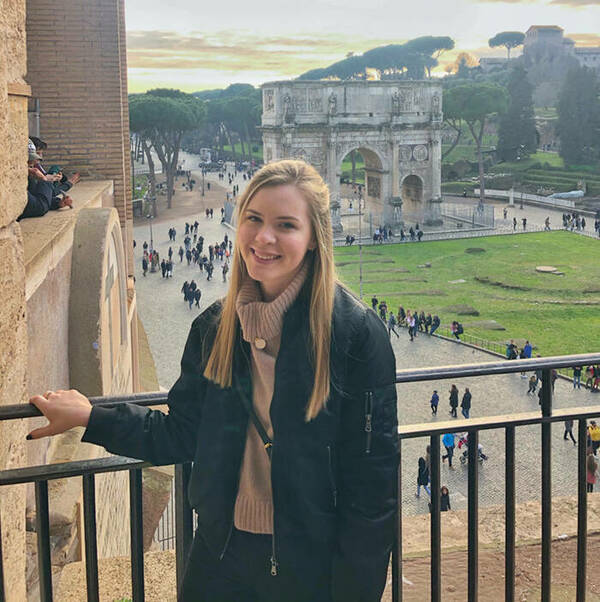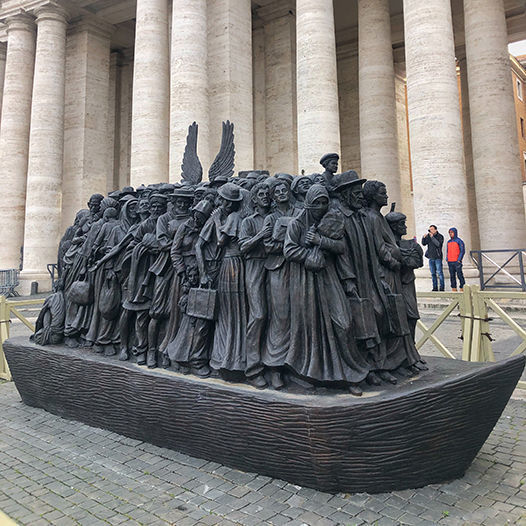
Last spring Abigail Campbell ’20 traveled to Rome, Italy to conduct interviews with key individuals, institutions, and organizations to gain a deeper understanding of the effects that the recent change in national government and ministerial leadership has had on refugee integration in Italy.
The divisive rhetoric of the populist Italian government, which held office from June 2018 to September 2019, created a multi-dimensional schism within Italian society. The burden of responsibility for refugee integration fell on local community leaders, non-governmental organizations, and individuals alike to fill the void left by the recent “Salvini Decree” (decreto legge 113/2018), which formally abolished humanitarian protection status and completely reformed the legal and funding structures of reception facilities and integration programs for refugees. As a result of the decree, thousands of migrants have been, and continue to be, left homeless, powerless, subject to exploitation, and deprived of basic human rights.
Although Matteo Salvini, the outspoken anti-migrant Minister of the Interior, was ousted from office in his own failed attempt to trigger a snap election (where he inaccurately expected his party Lega (League) to successfully obtain Prime Ministerial power), he remains an outspoken figure within Italian society, voicing his imminent resurgence to political power. In the meantime, Salvini’s position as Minister of the Interior has been filled by Luciana Lamorgese, a migration specialist with a softer approach. While she seeks to foster a more humanitarian attitude toward migration, one that also balances the priority of domestic security, the restrictive Salvini Decree continues to govern the migration system.
In spring 2020, I traveled to Rome to better understand how the most recent shift in Ministerial leadership from Salvini to Lamorgese has affected institutions, organizations, and individuals with refugee-centric missions. Given how soon after this shift I travelled to Rome for this research, I was unaware of any academic publications at that time that had explored the ramifications of this change.
In this fieldwork, I sought to discover the following: (a) What effect, if any, has the shift in Ministerial power, from Salvini to Lamorgese, had on local projects of integration?; (b) What effect, if any, has the shift in leadership had on refugee policies, and what role does the Salvini Decree play in governing refugee integration now that Salvini is not in power?; (c) What are the institutional and organizational attitudes toward the new administration, and have feelings regarding the future changed? To uncover answers to these questions, I conducted interviews with experts from seven key organizations in the fields of migration and integration in Rome. The organizations included the National Italian Network for Refugees and Exiled (UNIRE), A Buon Diritto, Action Aid, Centro Astalli, Refugees Welcome, the Joel Nafuma Refugee Center, and Cittalia, a government entity. Of these, I will highlight two of the most valuable and insightful.
First, I met with Sayed Hasnain, the founder of UNIRE, the only refugee-led advocacy group at the national level in Italy. While the organization was only in operation a few months at that time, it had already gained traction at the national and EU levels—they had attended high profile conferences in Brussels, met with the United Nations High Commissioner for Refugees, and been invited to sit on national governmental migration policy committees. This conversation allowed me to gain insight into the challenges the group faces in order to legitimize itself within the NGO sphere and within governmental politics. Hasnain was able to provide invaluable insight into the instability and unpredictability of the government and its perpetual policies that restrict refugees’ rights.

The second interview that I will highlight came truly unexpectedly. Towards the end of my stay, I received an email back from Daniela Di Capua, the former director of the migrant integration system, who had resigned in August due to Ministry politics under Salvini’s administration. She had been at odds with the Ministry’s political rhetoric and philosophy. This interview was truly once-in-a-lifetime, as Di Capua held one of the most influential roles in the political sphere of migration for over eight years. She had worked first-hand with many administrations and a range of politicians, including Salvini. The insights I gained from our conversation were unparalleled, insights not found in journal articles or news pieces. Di Capua spoke about the evolution of the Ministerial leadership and the specific policies that developed over time. She shed light on her experience as the director of the Protection System for Asylum Seekers and Refugees (SPRAR) and the challenges she and the system faced under Salvini. Ultimately, I could have written a successful senior thesis rooted in the knowledge I was able to gain from just this interview, which made a meaningful trip even more worthwhile.
This research project provided invaluable clarity into my own process of developing and finalizing my thesis. Before the trip, I felt as if information was missing from the holistic puzzle I had been trying to complete. However, in meeting with migration experts and professionals, I was able to address gaps in my research and bring a clearer image of the politics surrounding migration and integration into view. I returned to the U.S. with a renewed sense of clarity, focus, and a feeling of wholeness in the overall development of content for my thesis.
The opportunity to research in Italy and conduct these interviews allowed me to further develop my understanding of the complexities inherent in the dynamic sociopolitics of migration. It allowed me to cultivate relationships with individuals who hold significant positions within the sphere of migration in Italy, who have offered their expertise and guidance in my continual discernment both academically and professionally. My conversations with these experts provided political insight that I would not have gained otherwise and without which my thesis’s conclusions would have been based on outdated information. Instead, through my senior thesis I was able to contribute novel insights to the field of migration studies, insights made possible by first-hand research and analysis in Rome and my Nanovic grant.
This article is part of a series of blog posts published by the Nanovic Institute for European Studies. The Nanovic Navigator is home to stories told by students about their experiences exploring Europe and European Studies through the support of the Nanovic Institute.
Originally published by at nanovic.nd.edu on October 29, 2020.